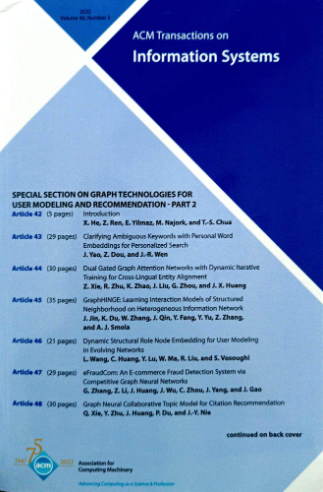推荐系统中的对比自监督学习研究综述
IF 9.1
2区 计算机科学
Q1 COMPUTER SCIENCE, INFORMATION SYSTEMS
引用次数: 3
摘要
近年来,基于深度学习的推荐系统取得了显著的成功。然而,这些方法通常严重依赖于标记数据(即用户-项目交互),因此存在数据稀疏性和冷启动等问题。自监督学习是一种新兴的范例,它从未标记的数据中提取信息,为解决这些问题提供了见解。具体来说,对比自监督学习由于其灵活性和良好的性能,引起了人们的广泛关注,最近成为基于自监督学习的推荐方法的一个主导分支。在这项调查中,我们提供了一个最新的和全面的审查,目前对比自监督学习为基础的推荐方法。首先,我们为这些方法提出了一个统一的框架。然后,我们介绍了一个基于框架关键组件的分类法,包括视图生成策略、对比任务和对比目标。对于每个组件,我们提供了详细的描述和讨论,以指导选择合适的方法。最后,我们概述了未来研究的开放问题和有希望的方向。本文章由计算机程序翻译,如有差异,请以英文原文为准。
Contrastive Self-supervised Learning in Recommender Systems: A Survey
Deep learning-based recommender systems have achieved remarkable success in recent years. However, these methods usually heavily rely on labeled data (i.e., user-item interactions), suffering from problems such as data sparsity and cold-start. Self-supervised learning, an emerging paradigm that extracts information from unlabeled data, provides insights into addressing these problems. Specifically, contrastive self-supervised learning, due to its flexibility and promising performance, has attracted considerable interest and recently become a dominant branch in self-supervised learning-based recommendation methods. In this survey, we provide an up-to-date and comprehensive review of current contrastive self-supervised learning-based recommendation methods. Firstly, we propose a unified framework for these methods. We then introduce a taxonomy based on the key components of the framework, including view generation strategy, contrastive task, and contrastive objective. For each component, we provide detailed descriptions and discussions to guide the choice of the appropriate method. Finally, we outline open issues and promising directions for future research.
求助全文
通过发布文献求助,成功后即可免费获取论文全文。
去求助
来源期刊

ACM Transactions on Information Systems
工程技术-计算机:信息系统
CiteScore
9.40
自引率
14.30%
发文量
165
审稿时长
>12 weeks
期刊介绍:
The ACM Transactions on Information Systems (TOIS) publishes papers on information retrieval (such as search engines, recommender systems) that contain:
new principled information retrieval models or algorithms with sound empirical validation;
observational, experimental and/or theoretical studies yielding new insights into information retrieval or information seeking;
accounts of applications of existing information retrieval techniques that shed light on the strengths and weaknesses of the techniques;
formalization of new information retrieval or information seeking tasks and of methods for evaluating the performance on those tasks;
development of content (text, image, speech, video, etc) analysis methods to support information retrieval and information seeking;
development of computational models of user information preferences and interaction behaviors;
creation and analysis of evaluation methodologies for information retrieval and information seeking; or
surveys of existing work that propose a significant synthesis.
The information retrieval scope of ACM Transactions on Information Systems (TOIS) appeals to industry practitioners for its wealth of creative ideas, and to academic researchers for its descriptions of their colleagues'' work.
 求助内容:
求助内容: 应助结果提醒方式:
应助结果提醒方式:


